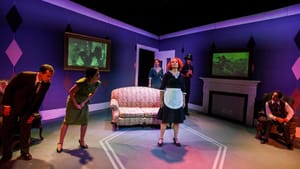Stay in the Loop
BSR publishes on a weekly schedule, with an email newsletter every Wednesday and Thursday morning. There’s no paywall, and subscribing is always free.
Logical absurdity
Curio Theatre's 'Bald Soprano'

I doubt “absurdist” means much to most people. “Oh, it’s going to be nonsensical,” I imagine people complaining. “I don’t understand normal plays, so I’m going to be lost.” Part of the problem is that we expect stories to be easily understood.
I want to blame this on TV and film, but it’s true in theater, too: We want motivations to be logical and explained; we want characters to make decisions and events to occur for clear reasons; and we want stories to add up to a neat, all-encompassing message. Perhaps we want this because our lives don’t provide tidy structure, or the satisfaction of justice. Maybe we just like to feel smart.
I’m not against any of that, but I think we should have to earn understanding, not have it handed to us. Moreover, we should be open to feeling things other than “I’m a smart girl because I get it” or “I’m a clever boy because I solved it.” Confusion is a feeling, and so are pain, loss, and fear. Even joy. Must we “get it” to feel these?
Eugène Ionesco’s 1949 one-act play, The Bald Soprano — and, in some ways, all plays that earn the “absurdist” tag — resists logic, but allows us (nay, challenges us) to feel. The label assures us that we don’t have to “get it” to appreciate it. The current Curio production satisfies in this way, though director Charlotte Northeast can’t resist trying to help us get it.
The production, which uses Tina Howe’s streamlined adaptation with language more accessible than a typically stiff translation from the French, announces its absurdity first with Paul Kuhn’s wonderfully loopy set. The action is set in a sparse living room angled toward the audience with a forced perspective, decorated with argyles and bold, abstractly colorfully lighting by Steve Carpenter. The fireplace is a monitor screen showing a fire video, and two other screens display generic paintings, but soon begin sharing provocative and subversive messages.
“Can’t a fellow free-associate?”
Rachel Gluck and CJ Keller play the Smiths, who stuffily review their ordinary day with an undercurrent of curt British malice that’s most amusing. Soon guests arrive: the Martins (Maria Konstantinidis and Ken Opdenaker), whose conversation is equally vapid, but amusing in a different way, because they seem not to know each other, discovering their ardor for the first time. Aetna Gallagher addresses us directly as the Smiths’ sassy maid, and the Fire Captain (Brandon Pierce) joins in the fun. Discussions build through tongue twisters (“seven silver salad servers”) and non sequiturs — any fan of Monty Python’s Flying Circus will recognize the patter — into obtuse platitudes that sound like wisdom (“When I say ‘yes,’ it’s a figure of speech”).
Perhaps unwilling to trust absurdism, Curio layers in a subtext of repressed sexuality, which certainly makes sense — it’s a major theme in depictions of suburban middle-class, middle-aged life — but there’s the problem: It makes sense. It becomes logical. We nod triumphantly, “Now I get it!” just the way TV and film and modern American plays have trained us to. We know nothing else. (I am a victim, too, I confess.)
The production is undeniably funny: 80 brisk minutes of daffy behavior played straight, sprinkled with wonderfully clever little moments, plus that onscreen commentary, which mirrors the Internet’s instant responses. Ionesco’s ending, if we can call it that (and which I would rather not reveal), gets lost in the traditional structure that Northeast imposes.
This Bald Soprano is enjoyable and entertaining, but too comfortable for the word “absurdist.” It’s both a success and an opportunity missed. Can’t a fellow free-associate? It’s not as easy as it seems.
What, When, Where
The Bald Soprano by Eugène Ionesco, adapted by Tina Howe. Charlotte Northeast directed. Presented by Curio Theatre Company. Through December 19 at 4740 Baltimore Ave., Philadelphia. 215-525-1350 or curiotheatre.org.
Sign up for our newsletter
All of the week's new articles, all in one place. Sign up for the free weekly BSR newsletters, and don't miss a conversation.
 Mark Cofta
Mark Cofta